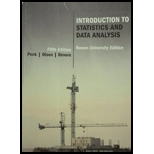
Concept explainers
Suppose that the distribution of scores on an exam can be described by a normal curve with
- a. What is the 84th percentile?
- b. What is the approximate value of the standard deviation of exam scores?
- c. What z score is associated with an exam score of 90?
- d. What percentile corresponds to an exam score of 140?
- e. Do you think there were many scores below 40? Explain.
a.
Find the 84th percentile of the distribution.
Answer to Problem 73CR
The 84th percentile of the distribution is 120.
Explanation of Solution
Calculation:
It is assumed that the exam scores were distributed to normal with mean 100 to its corresponding standard deviation of 80. It is also given that the 16th percentile of the distribution is 80.
The
The value of the 16th percentile is 20 units below the mean. In the same way, the value of the 84th percentile is 20 units above the mean, which will be obtained as given below:
Therefore, the 84th percentile of the distribution is 120.
b.
Find the approximate value of the standard deviation of the exam scores.
Answer to Problem 73CR
The approximate value of the standard deviation of the exam scores is 20.
Explanation of Solution
Calculation:
From Part (a), it is observed that the percentage of the exam scores below 80 is 16% and the percentage of the exam scores above 120 is 16%.
The percentage of the exam scores between 80 and 120 is given below:
Empirical Rule:
The empirical rule for a normal model states as follows:
- Within 1 standard deviation of mean, 68% of all observations will lie.
- Within 2 standard deviations of mean, 95% of all observations will lie.
- Within 3 standard deviations of mean, 99.7% of all observations will lie.
Based on the empirical rule, 68% of the observation will fall between 1 standard deviation about mean. Therefore, the range of the values that falls within 1 standard deviation is 80 and 120.
The approximate value of the standard deviation is obtained as given below:
The above calculation states that the value of standard deviation is 20 units approximately.
c.
Find the z-score for the exam score of 90.
Answer to Problem 73CR
The z-score for the exam score of 90 is –0.5.
Explanation of Solution
Calculation:
Standardized z-score:
Standardized z-score of an observation is defined as the number of standard deviations the observation is away from the mean. The standardized z-score is also known as the standard score. The standardized z-score is obtained as follows:
The standardized z-score for the exam score of 90 is obtained as given below:
In this case, observation = 90.
Substitute the corresponding value to get the z-score.
Thus, the standardized z-score is –0.5.
The z-score of –0.5 implies that the observation of 90 is 0.5 standard deviations below the mean score of 100.
d.
Find the percentile that corresponds to an exam score of 140.
Answer to Problem 73CR
The percentile that corresponds to an exam score of 140 is 97.5.
Explanation of Solution
Using empirical rule, the range of the values that falls within 2 standard deviations is given below:
Based on the empirical rule, 95% of the observation will fall between 2 standard deviations about mean.
The score of 140 falls above 2 standard deviations from the mean.
However, the empirical rule states that 5% of observation falls above or below the mean. Thus, the proportion of scores, which falls greater than 140, is
e.
State whether it is appropriate to think that “there were many scores below 40.”.
Answer to Problem 73CR
No, it is not appropriate to think that “there were many scores below 40.”
Explanation of Solution
Calculation:
Using empirical rule, the range of the values that falls within 3 standard deviations is given below:
Based on the empirical rule, 99.7% of the observation will fall between 3 standard deviations about mean.
Thus, the score of 40 falls 3 standard deviations below the mean.
The percentage of the scores that falls below 40 is given below:
Therefore, the percentage of the scores that falls below 40 is only 0.15%.
Thus, it is not appropriate to think that “there were many scores below 40”.
Want to see more full solutions like this?
Chapter 4 Solutions
Introduction to Statistics and Data Analysis
Additional Math Textbook Solutions
Statistics Through Applications
Business Statistics: A First Course (8th Edition)
Statistics: The Art and Science of Learning from Data (4th Edition)
 Glencoe Algebra 1, Student Edition, 9780079039897...AlgebraISBN:9780079039897Author:CarterPublisher:McGraw Hill
Glencoe Algebra 1, Student Edition, 9780079039897...AlgebraISBN:9780079039897Author:CarterPublisher:McGraw Hill Algebra: Structure And Method, Book 1AlgebraISBN:9780395977224Author:Richard G. Brown, Mary P. Dolciani, Robert H. Sorgenfrey, William L. ColePublisher:McDougal Littell
Algebra: Structure And Method, Book 1AlgebraISBN:9780395977224Author:Richard G. Brown, Mary P. Dolciani, Robert H. Sorgenfrey, William L. ColePublisher:McDougal Littell Holt Mcdougal Larson Pre-algebra: Student Edition...AlgebraISBN:9780547587776Author:HOLT MCDOUGALPublisher:HOLT MCDOUGAL
Holt Mcdougal Larson Pre-algebra: Student Edition...AlgebraISBN:9780547587776Author:HOLT MCDOUGALPublisher:HOLT MCDOUGAL Big Ideas Math A Bridge To Success Algebra 1: Stu...AlgebraISBN:9781680331141Author:HOUGHTON MIFFLIN HARCOURTPublisher:Houghton Mifflin Harcourt
Big Ideas Math A Bridge To Success Algebra 1: Stu...AlgebraISBN:9781680331141Author:HOUGHTON MIFFLIN HARCOURTPublisher:Houghton Mifflin Harcourt College Algebra (MindTap Course List)AlgebraISBN:9781305652231Author:R. David Gustafson, Jeff HughesPublisher:Cengage Learning
College Algebra (MindTap Course List)AlgebraISBN:9781305652231Author:R. David Gustafson, Jeff HughesPublisher:Cengage Learning




